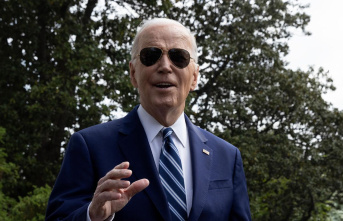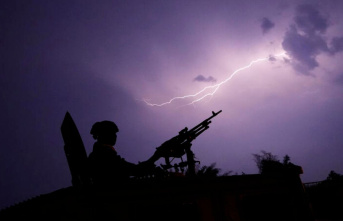Monday's statement by President Joe Biden was a declaration that the U.S. would respond militarily to any Chinese invasion of Taiwan. It also stated that the United States will continue to defend the island, "even more so" following the Russian invasion of Ukraine. This was the strongest presidential statement in support of Taiwan's self determination in decades.
Biden answered a question at a Tokyo news conference, "yes," when asked if it was possible to help defend Taiwan militarily if China invades. He said, "That's our commitment."
Since Taiwan does not have a mutual defense treaty with the United States, it has always avoided giving Taiwan an explicit security guarantee. Instead, it has maintained a policy of strategic ambiguity about how far it is willing to go. The 1979 Taiwan Relations Act governs U.S. relations to Taiwan. It does not require the U.S. military intervention if China invades. However, it makes it a policy of the United States to ensure Taiwan has the resources necessary to defend itself, and prevent Beijing from unilaterally changing its status.
According to a White House official, Biden's comments were not indicative of a change in policy for the United States. This was reinforced by Lloyd Austin, Defense Secretary. Austin was asked by reporters whether Biden's response indicated that the U.S. would help Taiwan more than it helped Ukraine, and if the U.S. had made a commitment to send troops to Taiwan in case of invasion.
Austin stated at the Pentagon, "As President said our One China Policy has not changed." He reiterated this policy and our commitment for peace and stability in the Taiwan Strait. He also highlighted Taiwan's commitment to the Taiwan Relations Act, which will help it defend itself. Our policy has not changed."
However, Biden's words provoked a sharp reaction from mainland China. It claimed Taiwan was a rogue territory.
Wang Wenbin, spokesperson for the Chinese Foreign Ministry, expressed her "strong dissatisfaction" and "resolute opposition” to Biden’s comments. China is not open to compromises or concessions when it comes to issues that affect its core interests, such as sovereignty and territoriality.
He said, "China will take strong action to protect its sovereignty and security interest, and we'll do what we say."
Biden spoke alongside Fumio Kishida the Japanese Prime Minister. He said that any attempt by China to use force to punish Taiwan was "just not appropriate." He also stated that it would "dislocate all of Asia and be another similar action to what happened in Ukraine."
China has intensified its military provocations against democratic Taiwan over the past few years in an attempt to intimidate it into accepting Beijing’s demands for unification with the communist mainland.
Biden spoke of China, saying that "they're already flirting in danger right now by flying close and all the maneuvers they are undertaking."
The "one China" policy recognizes Beijing as China's government and has no diplomatic relations with Taiwan. The U.S. has informal contacts with Taiwan, including a Taipei embassy. It also supplies military equipment to the island's defense.












